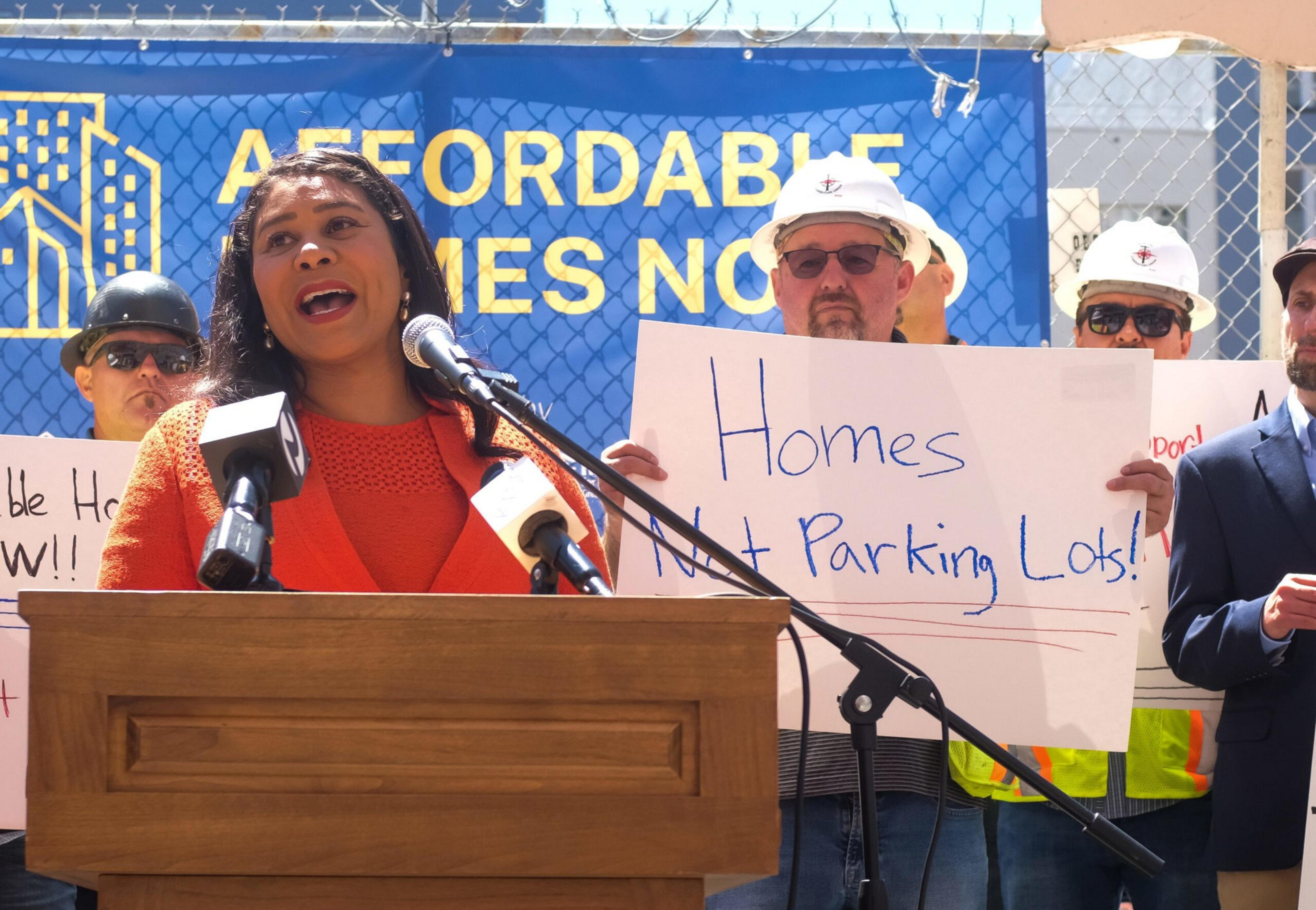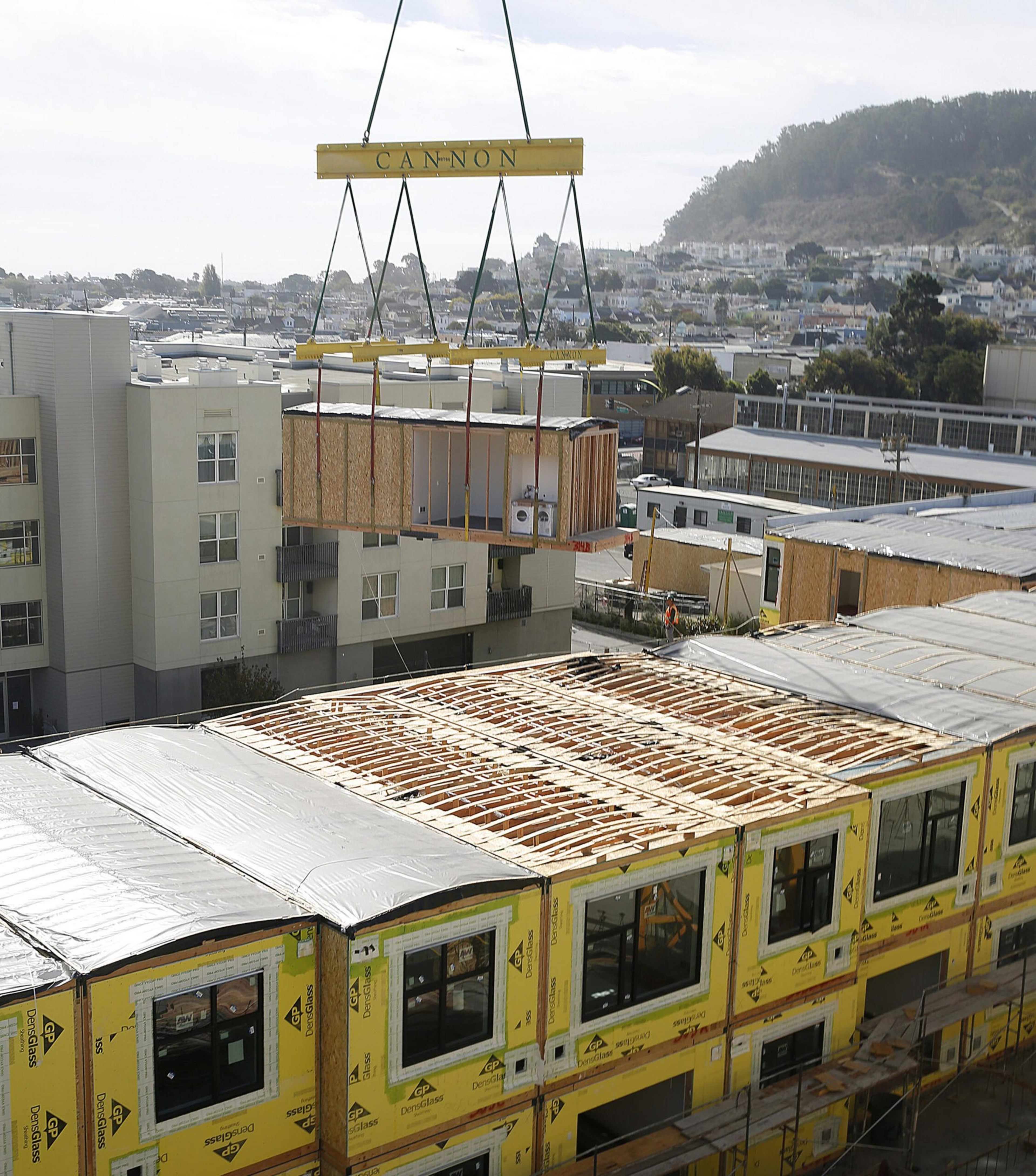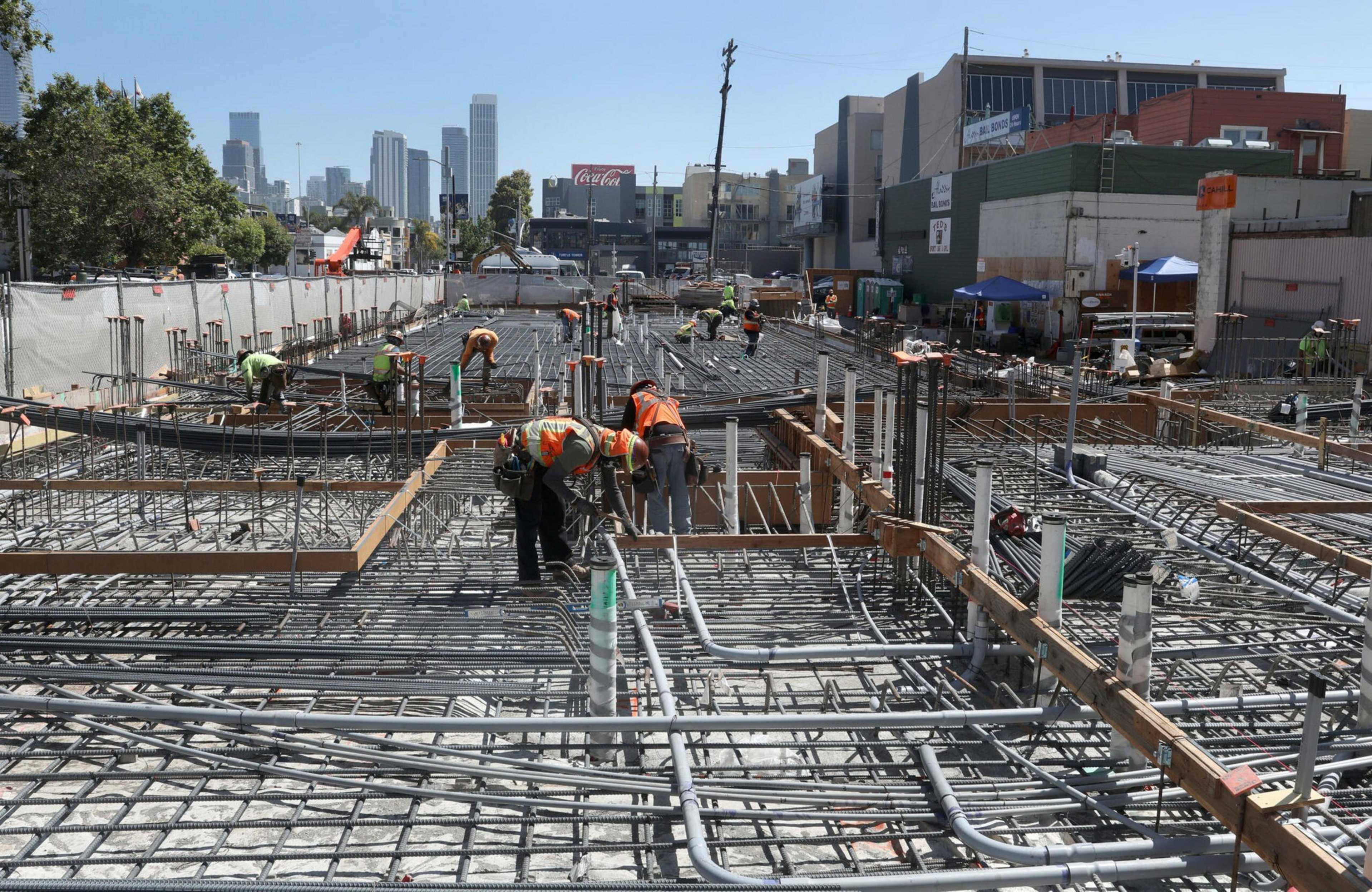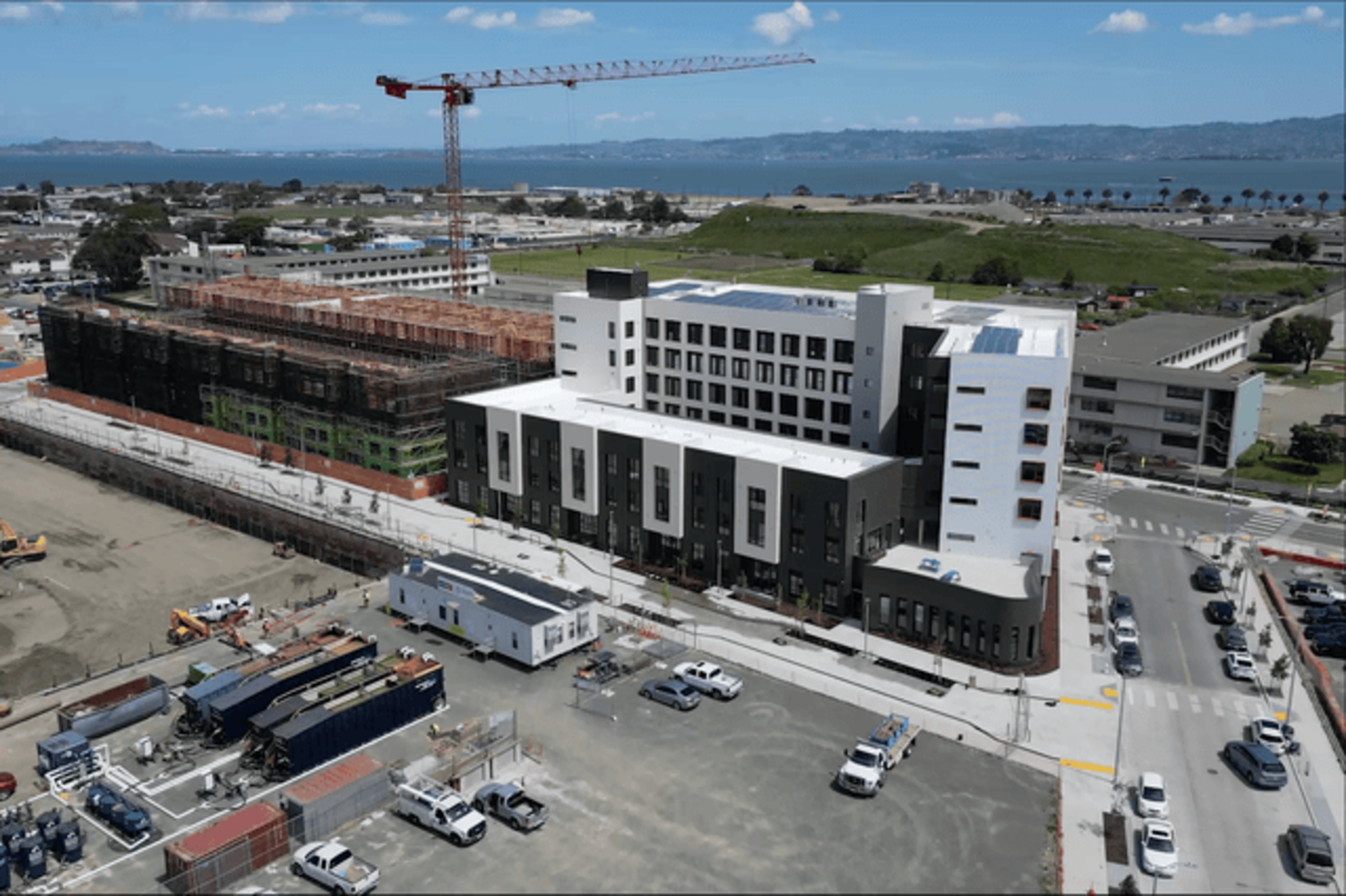In the coming months, Mayor London Breed and other city officials are expected to announce the opening of Maceo May, a six-story, 105-unit affordable housing development specifically designed for formerly homeless veterans and families on Treasure Island.
The project is one of many currently underway on the man-made island, which has essentially become a 400-acre construction zone. However, when it comes time for city officials to cut the ribbon on Maceo May, one notable group won’t be in attendance: the San Francisco Building and Construction Trades Council.
For years, the organization representing more than two dozen labor unions in San Francisco has been butting heads with Breed and other elected officials on how the city intends to meet its housing goals—and who should be doing that work. In the case of Maceo May, the Building Trades were essentially boxed out.

The project instead relied on a unionized group of carpenters working out of Factory_OS (opens in new tab), a modular construction plant on Mare Island in Vallejo. What the prefabricated homes may lack in flash, they make up for in efficiency. Supporters of the assembly-line style of production—which includes almost every aspect of a build-out, from the plumbing and electrical to the flooring—say it can radically reduce the cost and duration of construction.
San Francisco has an ambitious state mandate to build 82,000 units of housing by 2031, and Breed and pro-housing advocates see modular construction as an important avenue in reaching that lofty goal. But a war being waged on two fronts—one between the Building Trades and a coalition of carpenters, and the other between the Building Trades and City Hall—is threatening to derail that progress, with disputes on multiple issues boiling over into strongly worded letters and multimillion-dollar fights at the ballot box.
To understand why that matters and what comes next, it might help to recall an act of God that occurred a year and a half ago.
Monsoon on Treasure Island
In October 2021, a “bomb cyclone” (opens in new tab) more powerful than any storm seen in the previous quarter-century drenched the Bay Area. An atmospheric river traversed across the Pacific Northwest, causing hundreds of millions of dollars of damage across the Left Coast.
Maceo May wasn’t spared. The storm’s heavy downpour and high-speed winds ravaged the development for one key reason: Maceo May didn’t come with a roof.
The prefab project—built by members of the Northern California Carpenters Union at Factory_OS—was delivered topless to Treasure Island, with plans to complete roofing at a later stage in construction. Despite “round-the-clock staffing” to protect the project, city officials said the damage was substantial.
“The project’s location on Treasure Island, in the middle of the Bay and subject to particularly high winds, led to extraordinary damages at this location,” Anne Stanley, a spokesperson for the Mayor’s Office of Housing and Community Development, said in an email. “Given that modular units are installed before the building’s finish materials or roof are built/installed, units are delivered covered in protective wrappings, but at least some of those wrappings had already been removed for installation.”
The storm harmed nearly every aspect of Maceo May’s build-out, and the estimated cost to repair and complete the project ballooned by nearly $35 million, raising the total price tag to $110 million and delaying completion by more than six months.
The devastation was shocking, said Malcolm Yeung, the executive director of the Chinatown Community Development Center, which partnered with the nonprofit Swords to Plowshares to build Maceo May.
“Did I have a sinking feeling in the pit of my stomach when I heard the news? Yeah,” Yeung said. “Did my eyes pop out of my head? Yeah. I had to find them and put them back in my skull.”
San Francisco issued new loans to keep the project moving forward, but the extent of the damage and increase in costs have gone unreported until now. City officials expect all of Maceo May’s units to be leased by June.
Who’s Got Skill?
According to leaders of the local Building Trades, the mistakes made at Maceo May are just one example of a larger trend in which local construction jobs are being shipped out of San Francisco to less-skilled workers, resulting in mistakes and additional costs that aren’t accounted for in bids.

Larry Mazzola, president of the Building Trades, has sent multiple letters to the mayor and supervisors calling out Factory_OS, accusing the city of using “smoke and mirrors” to avoid hiring properly skilled and trained San Franciscans and paying prevailing wages.
In a letter from March 2021, Mazzola listed 14 bullet points worth of issues about a modular project at 833 Bryant St. in the South of Market area, noting numerous code violations. While the work of Building Trades’ members is inspected throughout the process of construction, Mazzola said, modular projects are delivered nearly complete, making it impossible to inspect issues like electrical wiring without opening up the walls.
“The carpenters go around telling everybody that it’s too expensive to build housing with union labor, and it’s completely false,” Mazzola told The Standard, citing his shop’s work on the Jazzie Collins Apartments (opens in new tab).
Jay Bradshaw, executive secretary-treasurer of the Nor Cal Carpenters Union, disputed that characterization, noting that the Carpenters Union has the most workers in residential construction, including affordable housing.
“For Mazzola to make such a false and baseless statement should be an embarrassment to him,” Bradshaw said. “We have never made such a statement. He knows his statement is false and should be ashamed of himself.”
John Dougherty, the business manager and financial secretary for the International Brotherhood of Electrical Workers Local Union No. 6, also has taken issue with Factory_OS, which employs about 400 carpenters under the umbrella of the Nor Cal Carpenters Union.
“They’re taking electrical and performing it in-house, off-site for 21 bucks an hour,” Dougherty said. “It’s taking work opportunities for San Franciscans out of San Francisco.”
Four recent modular housing projects in San Francisco include: Maceo May; 833 Bryant St.; 410 China Basin St. in Mission Bay; and 1064 Mission St., a permanent supportive housing project also in SoMa.

The dispute between the SF Building Trades and carpenters came to a head in February, when the carpenters refused to sign a unity pledge with other laborers, leading to the union’s suspension. In turn, carpenters unions across Northern California pulled out of every other building trades council. They later joined the Bay Area Council (opens in new tab), a business association that partners with YIMBYs and counts the region’s biggest companies among its members.
The same month that storms hammered Maceo May, the local chapter for the International Brotherhood of Electrical Workers took a shot at modular housing with a video showing kitchen lights turning on when a worker tried to test the stove.
Supervisor Connie Chan has entered the fray on behalf of the Building Trades, and she suggested in a phone interview that modular projects and other exceptions to local provisions are a slippery slope.
“We are minimizing these long-standing values that we have, and I think that’s problematic,” Chan said.
However, the mayor and pro-development advocates cite two major issues in giving the Building Trades the work it desires: First, the costs of projects skyrocket when accounting for San Francisco unions’ prevailing wages; and second, there aren’t enough unionized laborers to meet San Francisco’s housing goals, let alone the entire state’s goal 2.5 million new units of housing.
“Just to be clear, everyone agrees—[building] trades, carpenters and myself—we’d like to see more unionization of the residential construction workforce. We all share that goal,” state Sen. Scott Wiener told The Standard. “But the sad reality is that right now only about 9% of residential construction workers are unionized. So, when you leave out non-unionized construction workers, you’re leaving out more than 90% of these construction workers, many of whom are capable and skilled, they’re just not in a union or a union apprenticeship program.”
The Factory Fight
Fights between unions and City Hall officials are far from unique. But as the city scrambles to meet a daunting state mandate, those fights could threaten efforts to speed up housing construction.

Proposition D, Breed’s signature proposal to streamline housing approvals, fell short last November, in part, because the Building Trades tossed hundreds of thousands of dollars into a competing measure, Prop. E. Meanwhile, a political action committee for the Nor Cal Carpenters Union threw $69,000 into the mayor’s housing measure. Both ballot measures failed.
“We wanted Prop. E to pass. We wouldn’t have put it on [the ballot] just to block Prop. D,” Mazzola said. “But the fact that it did block was an added bonus.”
The rift between the Building Trades and carpenters seems unlikely to be resolved anytime soon. The Nor Cal Carpenters Union has aligned with Wiener and Assemblymember Buffy Wicks (D-Oakland)—both champions of all forms of housing construction—in a calculated move that could bring them more work.
At a rally last week at City Hall, members of the carpenters union decried wage theft and tax fraud in between boastful chants about being carpenters. In an interview, Bradshaw, head of the Nor Cal Carpenters Union, dismissed the grievances of the local Building Trades on modular construction.
“It’s a total red-herring issue,” he said. “They had zero interest nor capability to expand into industrial production of housing.”
On the issue of being suspended by the SF Building Trades, Bradshaw added, “They have a right to fight us on it. Good for them.”
Political Winds Blow
In a show of support for the carpenters, Breed and Wiener both attended last week’s event at City Hall. Wiener is carrying two bills with the support of the carpenters: SB 4 (opens in new tab) and SB 423. The goal of both bills is to streamline and fast-track housing approvals.
City officials have stressed that modular housing is just one of many strategies in meeting its Housing Element, which calls for the 82,000 new units.
“Modular construction is one tool we can use, but it is just one tool of many,” said Jeff Cretan, a spokesperson for Breed. “There are numerous other improvements we need to make and we are always open to pursuing different innovative strategies to get more housing built faster.”
But a new front in the war over construction work in San Francisco has emerged in recent weeks. The Building Trades are now accusing the Mayor’s Office of Housing and Community Development (MOHCD) of abandoning the citywide Project Labor Agreement (opens in new tab), and cutting them out of jobs related to a 2019 housing bond measure (opens in new tab) that will lead to hundreds of millions of dollars in contracts.
The Mayor’s Office contends that affordable housing projects that receive funding from the city are not subject to the existing project labor agreement, which prompted the Building Trades to recruit the help of Supervisors Chan and Ahsha Safaí, the latter of whom is considering a run for mayor.
“The previous director of MOHCD sent a letter to the Trades clearly spelling out the city’s position on how the 2019 affordable housing bond would be spent and committed to skilled and trained workforce,” Safaí told The Standard. “That is pretty clear. As far as modular construction goes, we need leadership to bring a modular construction factory to San Francisco that includes all crafts.”
The new fight has affordable housing developers spooked, city officials said. The prospect of contracting with Building Trades laborers on all aspects of a project could raise the cost of construction, although Mazzola and others dispute this argument. If an impasse persists, the Building Trades might oppose a housing bond expected to go to voters in 2024.

“I don’t know,” Mazzola said. “Opposing a housing bond is tough, but I would like to think that we can work this out, so that there are no problems in the future.”
For some local housing advocates, however, this simmering beef between the Building Trades, City Hall and the carpenters is long overdue and necessary.
“I think the only path is to have this fight and for the carpenters to win,” said Laura Foote, executive director of YIMBY Action. “We’re never going to meet our housing goals under the requirements of the Trades. This fight needs to happen to bring us into the promised land.”
